- Home
- Darren Shan
03 City of the Snakes Page 5
03 City of the Snakes Read online
Page 5
The city’s an ancient, sprawling, troubled beast. Founded by Indians, it’s been built up over the centuries by the Incan priests who fled from the conquistadors and made their home here. They rule from the shadows, which maybe explains why the city is dark and menacing at heart. Chaos flourishes here, nurtured by the villacs, who ladle power out among the various gangs, pitting black against white, Italian against Spaniard, Irish against everybody. Street laws hold the gangs in check, but those laws change abruptly in accordance with the dictum of the priests.
The last weekend’s been especially rough. Major clashes in the northwest between the Kluxers and Troops. The Kluxers are an offshoot of the Ku Klux Klan, led by Eugene Davern, the guy who owns the Kool Kats Klub. Five years back I’d have said Davern was crazy if he thought he could take on the Troops. But power’s been slipping through the new Cardinal’s fingers. Individuals have defied him and he hasn’t cracked down hard. The belief on the street is that Capac Raimi’s weak, out of touch with the pulse of the city. Revolt’s been in the cards for ages.
Davern and his Kluxers are the start. I hate those KKK sons of bitches—I’ve strung up more than a few of them these past nine years—but they’re a powerful force and Davern’s a shrewd leader. I doubt they can defeat the Troops alone, but if other gangs riot and Raimi’s forces are split, they might just pull it off.
Not that The Cardinal will notice. Word has strengthened over the weekend. It now seems certain Raimi’s no longer running the show. Some say he’s been killed, others that he quit, more that he disappeared mysteriously. Whatever the truth, he’s not in situ at Party Central any longer. I don’t know who is in charge, but I don’t envy him. The city’s facing its worst bout of mayhem since the race riots of some decades back. I pity the fool charged with the hopeless task of averting it.
It’s almost dawn, Monday, and I’ve been on the go since Saturday evening, bar a few hours of sleep yesterday. Although most of the trouble’s been confined to the northwest, there’s been a domino effect all over, especially here. Eugene Davern may have rid the Kluxers of many of their icons—they’ve abandoned the white hoods and burning crosses—but leopards don’t change their spots. If they overcome the Troops and annex the northwest, the next area they’re likely to target is the black-dominated east.
People in this part of the city are edgy, and that edginess manifested itself over the weekend in violence. Gangs are fighting to expand their boundaries and recruit new members, preparing for the war they think is coming. Street kids are mugging freely, making the most of things while the going’s good, before the lynchings start. A police precinct was besieged when one of its officers remarked in a radio interview that the Kluxers’ taking over would be the best thing that ever happened.
The city hasn’t erupted—the Troops are still the force all others are measured by, and they’ve been working hard to hold things in place—but it isn’t far off. If Davern can drive the Troops out of the northwest, expect ballistics.
I’ve spent the weekend doing what I can to calm things locally. I’m known and feared all over the east. I’m the Black Angel… Mr. Moonshine… the Weasel. I kill mercilessly (very few know that I only punish the guilty—I take credit for the deaths of innocents whenever possible). I’m a creature of the night, a son of the shadows. Unstoppable. Utterly vicious.
I’ve taken advantage of my reputation and patrolled the streets relentlessly, breaking up fights and gatherings by intervening directly or simply showing my tattooed face and coughing ominously. I shouldn’t interfere. My father cared nothing for the welfare of others. To truly be him, I should focus only on killing. Paucar Wami relished bloodshed. Setting myself up as a vigilante is counterproductive. I should leave the east to the gangs, keep my head low.
But this is where I grew up. These are my people. Even though I have few friends, and mix with the locals as little as possible, I feel attached. There isn’t much of the old Al Jeery alive within me, but just enough lingers somewhere beneath my skin to make me do what I can to help between executions.
Monday, 22:00. I snatched several hours of sleep earlier and feel much fresher. I disguised myself as Al Jeery when I woke and went to do some shopping. I wear the makeup whenever I want to pass among ordinary people. Remove the contacts, don a wig, plaster the sides of my face with flesh-colored paint to hide the snakes, dump the leather jacket. I’m unrecognizable this way.
After a quick dinner I dispensed with the wig and makeup, slipped the contacts back in and took to the streets again, exiting my apartment by the fire escape and dark rear alley, as I always do when in Paucar Wami mode, careful not to reveal myself to any of my neighbors. I checked on a few of the worst trouble spots—things have calmed down, though I doubt the peace will hold—saw I wasn’t needed and returned to the business of meting out terror.
I’m on the prowl for a homosexual, homicidal rapist. He’s struck four times in three months. Brutally rapes his young male victims, then stabs them through the heart with an ice pick. A savage piece of work. More than worthy of the slow death he’s going to endure when I get hold of him.
Even as I think that, the small trace of a human within me whispers that there can be no justification for murder. Even though the people I kill are the lowest of the low, they have the right to be tried by law. I’m laboring under no delusions—what I do is wrong, unjust, immoral. If there’s an afterlife and a judgmental god, I’m in for the big drop. There can be no room for vigilantes in a civilized society, even one as beset by brutes as this. I’m no better than the scum I kill. If anything I’m worse, because I know what I do is wrong.
I turn down Cyclone Avenue, hugging the shadows, watching, waiting, at one with the night. Most of the buildings in the east date back to the 1950s. Old, tired, ugly, many in a state of slow collapse. The whole sector needs to be bulldozed and put out of its misery. That said, in the dark, with the crumbling brickwork, barred or splintered windows, and garbage-spattered streets obscured by the shady streaks of the night, it can almost pass for pleasant. Darkness becomes this city.
The rapist has struck in a different spot each time, no discernible pattern, but always in the east, between ten and midnight. I’ve been hunting for him since his second victim was discovered, slotting the search in around my other duties, scouring likely alleys, those that are ill lit and rarely used. Luck will need to be on my side if I’m to find him, but in my experience luck comes to those who work for it. I don’t always get my man—the Mounties can lay sole claim to that distinction—but few evade me once I focus on them.
The streets are as good as deserted. Mondays are traditionally quiet, and after the weekend we’ve endured, tonight’s even quieter than usual. I’m beginning to think I should head for home when I enter a cul-de-sac and spot two figures ahead, one on the ground, struggling and moaning softly, the other on top, thrusting with his hips and panting.
I slide against a damp, moss-encrusted wall and creep toward them. While I don’t jump to conclusions—although this looks like rape, I’ve come across couples engaged in equally violent but consensual intercourse before—1 do draw my knife and prepare for the worst.
Closer. The figure on the ground is male, black, fourteen or fifteen. Gagged and bleeding from a cut to his head. Trousers yanked down around his ankles. The man on his back swats him, hissing, stabbing at him with his penis. I don’t think he’s penetrated, and I also no longer think this is consensual. I’ve seen masochists put themselves through worse than this, but I’ve never seen naked terror in their eyes, the way I see it in the boy’s.
“That’s enough,” I say softly, stepping away from the wall, keeping my knife low by my side where the rapist can’t see it.
The man stops, startled, then pushes himself away from the boy and spins to confront me. He’s wearing a dark wool cap, pulled over his ears and forehead. A long, bulky jacket, open down the front. His trousers are crotchless. His exposed penis points at me like a dagger, uncommonly stiff.
&
nbsp; “Bastard!” the rapist snarls. He reaches behind the boy and grabs a short but finely pointed ice pick—my man!
“I’ve been looking for you.” I grin bleakly, sheathing my knife and drawing the .45 I keep for encounters such as these. Only a fool goes up against an ice pick with a knife.
“Bastard!” the rapist snaps again—a man of limited vocabulary—and starts toward me, pick held high.
I raise my gun to shoot but stop as I catch a clearer glimpse of his penis. I realize why it looked so strange. It isn’t real—it’s a strap-on dildo. As the folds of the rapist’s coat shift, it clicks—I’m dealing with a woman!
Momentarily startled, I forget to fire, and she’s upon me. She swings for my left arm with the pick. Luckily for me, she misjudges and it scrapes off my leather jacket harmlessly, to whistle across the expanse of my chest. She curses and reverses her movement, fluid, swift. But not swift enough. I step out of the way of the pick. She stumbles from the force of the missed blow. I take three more steps back, raise my gun again and fire before she recovers. Not a finely judged shot, but at this range it’s almost impossible to miss.
An unexpected zinging sound is followed immediately by a deeper, thudding noise—a bullet burying itself in flesh. The rapist collapses with a muffled shriek, dropping her pick, falling backward, hands flying to her stomach, coming away sticky with blood.
I close on her, ready to shoot again if I have to. The kid is on his feet, pulling up his pants. He hasn’t taken the gag out. “Go,” I grunt. “Don’t look back.” He nods gratefully and flees.
The woman—no, the rapist is mewing softly. I must think of her purely as the murdering defiler that she is. I was raised to be polite to women. Got to forget that. Focus on the task. Finish her off or wait for her to die.
As I study her, I see that the dildo no longer juts out straight from her groin. It’s bent to one side. The bullet must have struck the fake penis, then ricocheted upward—the source of the zing. I can’t prevent a wicked grin. She who lives by the dildo, dies by the dildo.
Noises behind me. My smile vanishes. I pivot, gun raised. When I see three half-naked old women entering the cul-de-sac, staring hungrily at the woman on the ground, I relax and step aside.
The women dart past me and fix on the stricken rapist. She ignores them when they fasten their clawlike fingers on her—she has other things to worry about—and only screams when they bite into her flesh. Her shrieks are short-lived. One of the Harpies is on her mouth in seconds, covering her lips with her own, kissing her silent, smothering her cries. In no time at all the rapist succumbs to the inevitable and yields beneath the onslaught. Her limbs go still. Her eyelids stop fluttering and the emptiness of death takes the place of living thought.
The Harpy draws back, bits of the rapist’s lips and tongue dangling from her teeth. She gurgles triumphantly, then joins the other two in their feast, tearing warm flesh from the corpse with her hands and teeth, swallowing it raw.
I avert my gaze and nod politely at the primly dressed, middle-aged woman who has followed the Harpies into the cul-de-sac. “Mrs. Abbots,” I greet her.
“Mr. Wami,” she responds with a wan smile. She observes the Harpies at feed, then turns to me with a worried frown. “She was alive when they started?”
“Yes.”
“Was she a bad person?” Her face contorts in anticipation of the answer. She does her best to keep the Harpies away from the innocent, but sometimes they feed on the corpses of the good as well as the bad.
“She was a child-raping murderess,” I sniff, and the worry deserts her.
“I’ll let them feed in peace then.”
Jennifer Abbots walks to the mouth of the cul-de-sac and waits for her charges to finish eating. After a last glance at the rapist and the Harpies—one of the cannibalistic ladies has dug through to the intestines and is reeling them out like a sailor drawing in his nets—I join her.
I first ran into the Harpies four, maybe five years ago. I’d just killed a guy who’d been selling spiked heroin when a quartet of crazed, near-naked women descended on him, ripped off his clothes and carved him up with their claws and teeth. I was repulsed and drew my gun to fire on them. I’d seen a lot of dark deeds during my time, but nothing as foul as this looked.
Jennifer stopped me. She threw herself at my arm and knocked my gun away, yelling, “No!” As I scrabbled for the gun, she fell to her knees, clasped her hands together and wept. “Please, I beg you, no. They don’t mean any harm. They can’t help themselves. They only feed on the dead.”
That struck a chord. It was ridiculous, but put across with such earnestness—as if feeding on a person was fine as long as they were dead—that I stopped and studied the woman, crying and dirty from the dust of the street, pleading with me to spare the feasting cannibals. I saw the rosary beads hanging from her neck, the gray in her hair, the anguish in her face. And I lowered my gun and let her talk.
The four women stripping the flesh from the bones of the dead dealer had been inmates in an asylum for the deranged. Privately run, very down-market, the sort of institution you read about in tabloid exposés, staffed by unqualified nurses, patients fed on watered-down porridge and stale bread, bedclothes washed once a month, orderlies having their wicked way with the unfortunate women. As if the situation weren’t grim enough, the staff had a run-in with the manager and walked out en masse. Whether because he expected them to return, or just didn’t have the funds to hire replacements, he took over the running of the asylum himself. The relatives of the inmates didn’t find that out until later. Few visited regularly, being either unwilling to face their incarcerated kin or unable, as in the case of Jennifer, who had to work three jobs to pay for the upkeep of her house and cancer-stricken husband.
For a couple of weeks the manager struggled by, buying food and drink from nearby supermarkets, using Laundromats to wash the sheets a few at a time. Perhaps he could have carried on indefinitely, but the strain must have gotten to him, because he died of a heart attack while preparing dinner one night. He was only discovered three weeks later, when a local councillor running for reelection wandered in with the intention of obtaining positive press shots of himself with some of the less privileged members of the community.
Nobody knows how long the crazed inmates tolerated the hunger pangs. Some held out to the end—there were nine to begin with, and three died of starvation. The other half dozen, having raided and emptied the cupboards, fridges and freezers, turned in the end to the only remaining food source—the manager and their dead companions.
“How’s life?” I ask Jennifer as we stand guard and wait for the Harpies to finish eating.
“So-so,” she answers. It’s been several months since we last ran into one another and she looks healthier than she did. “Rose died just before New Year’s, poor dear.” Rose was the mother of one of the Harpies. She’d been helping Jennifer care for the three remaining members of the cannibalistic clan.
“You’re looking after this lot by yourself?”
She shakes her head. “A very kind friend of mine, Mr. Clarke, has taken responsibility. He’s let them move in with him and he sees to their day-to-day needs. I’ve been able to relax for the first time in years, though I chip in with my share of the duties, which include chaperoning them when they go on the prowl.”
The councillor hushed up the scandal, terrified of being associated with a media nightmare. Bribing the photographer to keep his mouth shut, he contacted the relatives of the surviving inmates, told them what had happened and gave them the option of quietly coming to collect the survivors. Four responded, two didn’t. Jennifer and Rose, unwilling to leave any of the ladies to the discretion of the councillor—he promised to place them in a first-rate home, but they didn’t trust him—each took one of the “spare crazies” home along with her own relative.
With the survivors cleared, the councillor torched the nursing home, destroyed the evidence, put the mess behind him and focused on his campaig
n (in the end he lost by a thousand votes and hasn’t been heard of since).
Jennifer and Rose weren’t sure what to do with their charges. If they’d admitted them to another nursing facility, they would have had to explain where the women had been previously. The ladies were quieter than they’d been in the past, so Jennifer and Rose decided to tend to them by themselves until they could work something out.
The four weren’t difficult to care for. Apart from the occasional hysterical fit, they were model patients. Jennifer and Rose were both working women, but they arranged their shifts so that one was free while the other was busy. It wasn’t easy, but they managed, and everything ran smoothly until Rose fell asleep one afternoon while minding the four, and woke to find they’d vanished.
One frantic phone call later, Jennifer met Rose on the street and they went searching for the missing lunatics. They knew the women couldn’t get far—with no money, and dressed in simple gowns, they weren’t going to make much of a break for freedom—but the worry was that they’d attract attention, leading to all sorts of uncomfortable questions.
They searched the streets on foot, working in methodical circles. Nearly six hours later they found the quartet, crouched behind a garbage bin, sucking on the bones of a derelict who must have frozen or starved to death days before.
Jennifer and Rose were shocked, but since there was nothing they could do without calling the authorities and confessing, they opted to make the best of a bad lot, dumped the body in the bin and shepherded their stuffed, sated charges home.

 Ocean of Blood
Ocean of Blood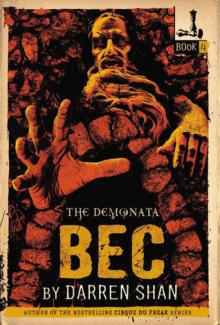 Slawter
Slawter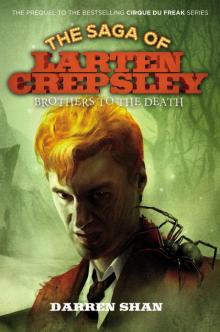 Brothers to the Death
Brothers to the Death Zom-B Clans
Zom-B Clans Zom-B Fugitive
Zom-B Fugitive Demon Thief
Demon Thief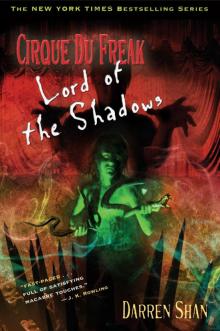 Lord of the Shadows
Lord of the Shadows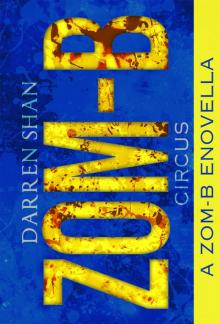 Zom-B Circus
Zom-B Circus Hell's Heroes
Hell's Heroes Bec
Bec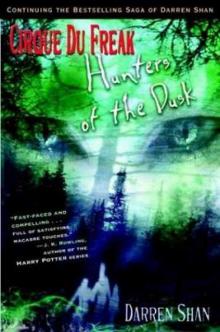 Hunters of the Dusk
Hunters of the Dusk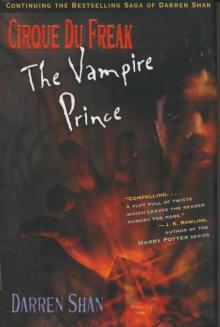 The Vampire Prince
The Vampire Prince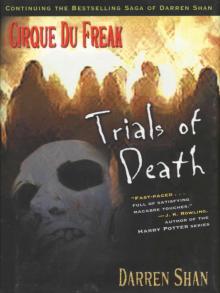 Trials of Death
Trials of Death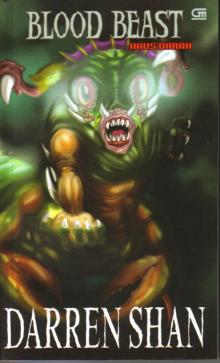 Blood Beast
Blood Beast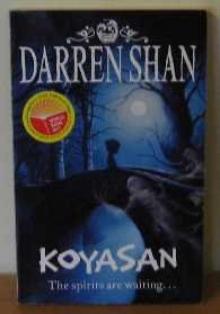 Koyasan
Koyasan Zom-B Goddess
Zom-B Goddess Wolf Island
Wolf Island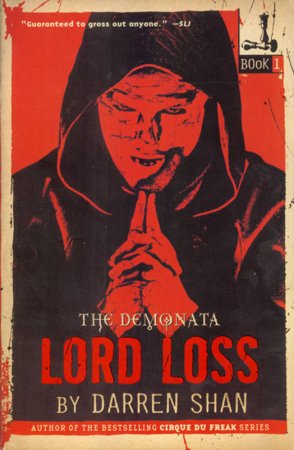 Lord Loss
Lord Loss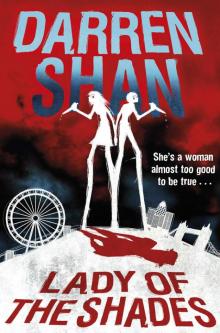 Lady of the Shades
Lady of the Shades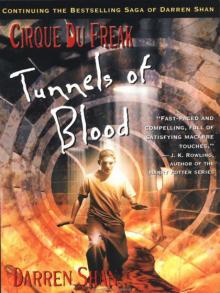 Tunnels of Blood
Tunnels of Blood Zom-B Bride
Zom-B Bride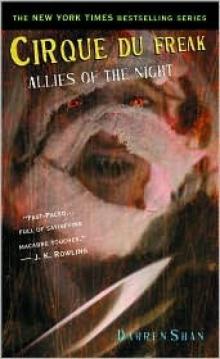 Allies of the Night
Allies of the Night Zom-B Baby
Zom-B Baby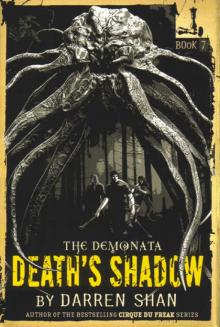 Deaths Shadow
Deaths Shadow Zom-B Angels
Zom-B Angels Zom-B Mission
Zom-B Mission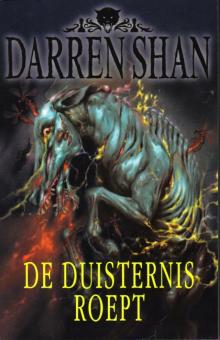 Dark Calling
Dark Calling First Bites
First Bites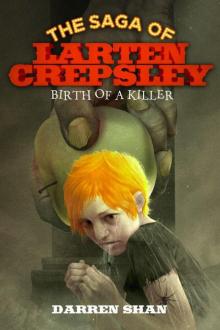 Birth of a Killer
Birth of a Killer Archibald Lox and the Bridge Between Worlds
Archibald Lox and the Bridge Between Worlds Archibald Lox and the Vote of Alignment
Archibald Lox and the Vote of Alignment Killers of the Dawn
Killers of the Dawn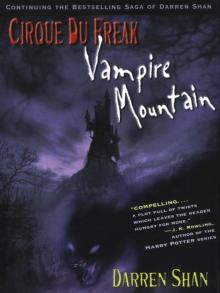 Vampire Mountain
Vampire Mountain Zom-B Gladiator
Zom-B Gladiator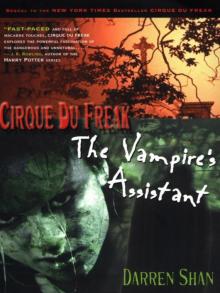 The Vampire's Assistant
The Vampire's Assistant Zom-B Family
Zom-B Family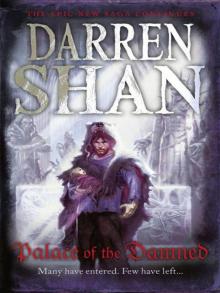 Palace of the Damned
Palace of the Damned A Living Nightmare
A Living Nightmare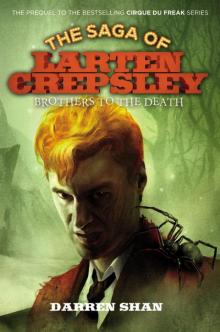 Brothers to the Death (The Saga of Larten Crepsley)
Brothers to the Death (The Saga of Larten Crepsley)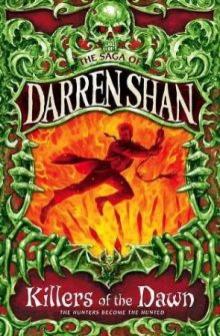 Killers Of The Dawn tsods-9
Killers Of The Dawn tsods-9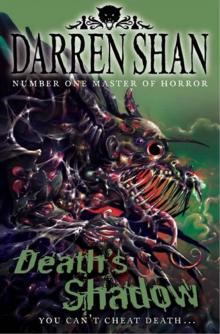 Death's Shadow td-7
Death's Shadow td-7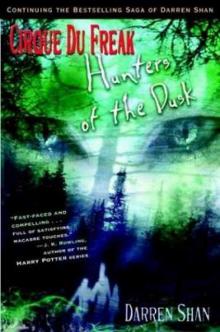 CIRQUE DU FREAK 7 - Hunters of the Dusk
CIRQUE DU FREAK 7 - Hunters of the Dusk Archibald Lox and the Forgotten Crypt
Archibald Lox and the Forgotten Crypt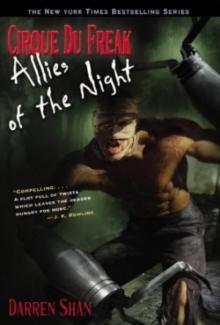 Allies Of The Night tsods-8
Allies Of The Night tsods-8 Hunters Of The Dusk tsods-7
Hunters Of The Dusk tsods-7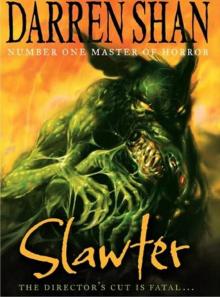 Slawter td-3
Slawter td-3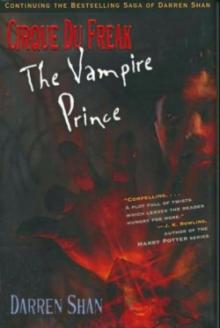 Vampire Prince tsods-6
Vampire Prince tsods-6 Archibald Lox and the Empress of Suanpan
Archibald Lox and the Empress of Suanpan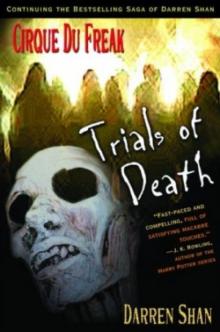 Trials Of Death tsods-5
Trials Of Death tsods-5 Hell's Horizon tct-2
Hell's Horizon tct-2 ZOM-B 11
ZOM-B 11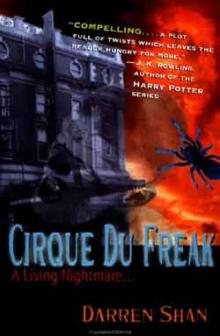 Cirque Du Freak - Book 1
Cirque Du Freak - Book 1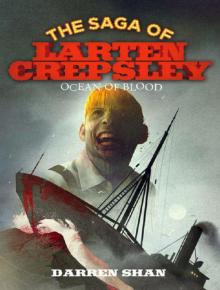 02 Ocean of Blood tsolc-2
02 Ocean of Blood tsolc-2 Wolf Island td-8
Wolf Island td-8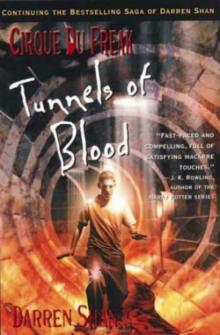 Tunnels of Blood tsods-3
Tunnels of Blood tsods-3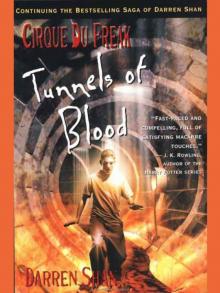 Cirque du Freak 3 - Tunnels of Blood
Cirque du Freak 3 - Tunnels of Blood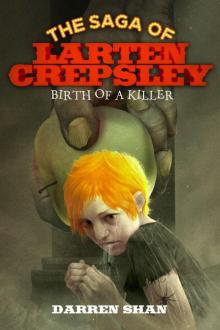 01 Birth of a Killer
01 Birth of a Killer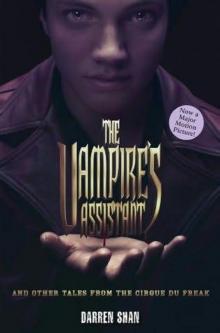 The Vampire's Assistant and Other Tales from the Cirque Du Freak
The Vampire's Assistant and Other Tales from the Cirque Du Freak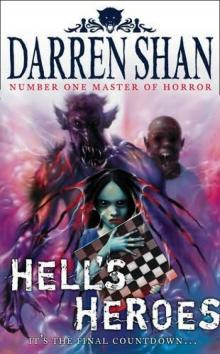 Hell's Heroes td-10
Hell's Heroes td-10 Zom-B #12
Zom-B #12![[Cirque du Freak 11] - Lord of the Shadows Read online](http://i1.bookreadfree.com/i1/03/31/cirque_du_freak_11_-_lord_of_the_shadows_preview.jpg) [Cirque du Freak 11] - Lord of the Shadows
[Cirque du Freak 11] - Lord of the Shadows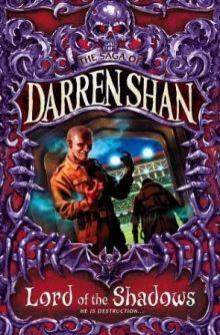 Lord Of The Shadows tsods-10
Lord Of The Shadows tsods-10 Demon Apocalypse td-6
Demon Apocalypse td-6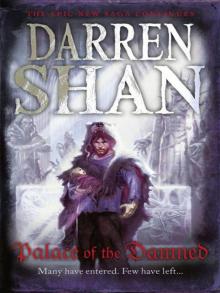 The Saga of Larten Crepsley (3) – Palace of the Damned
The Saga of Larten Crepsley (3) – Palace of the Damned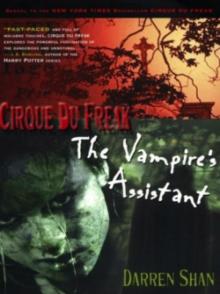 The Vampire's Assistant tsods-2
The Vampire's Assistant tsods-2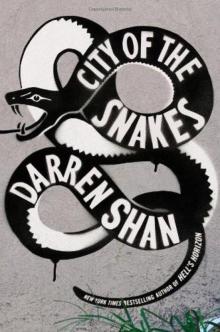 City of the Snakes tct-3
City of the Snakes tct-3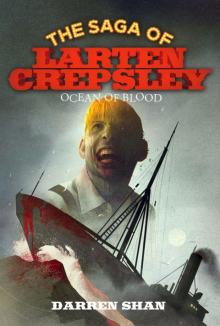 02 Ocean of Blood
02 Ocean of Blood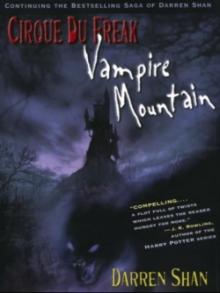 Vampire Mountain tsods-4
Vampire Mountain tsods-4 The Lake Of Souls tsods-11
The Lake Of Souls tsods-11 Lord Loss td-1
Lord Loss td-1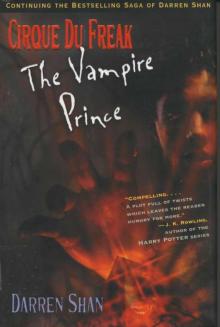 Cirque Du Freak Book 6 - Vampire Prince
Cirque Du Freak Book 6 - Vampire Prince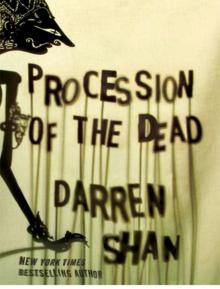 Procession of the dead tct-2
Procession of the dead tct-2 Vampire Prince
Vampire Prince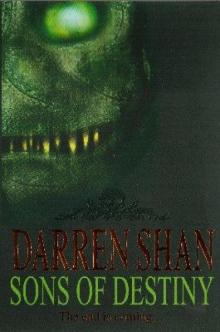 Sons Of Destiny tsods-12
Sons Of Destiny tsods-12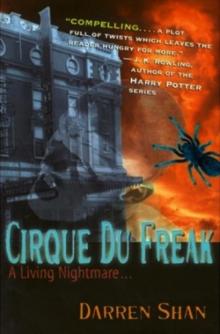 Cirque Du Freak tsods-1
Cirque Du Freak tsods-1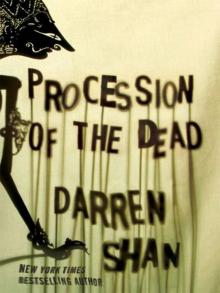 Procession of the Dead
Procession of the Dead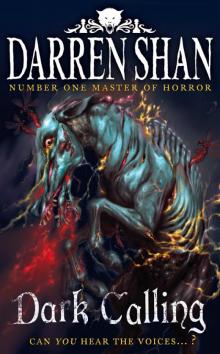 Dark Calling td-9
Dark Calling td-9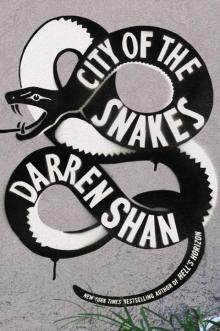 03 City of the Snakes
03 City of the Snakes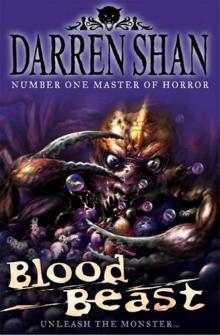 Blood Beast td-5
Blood Beast td-5 Demon Thief td-2
Demon Thief td-2